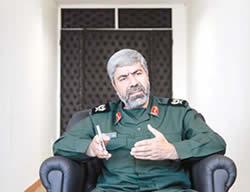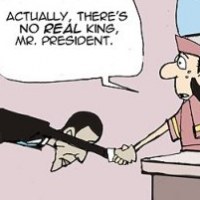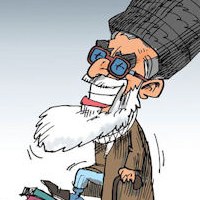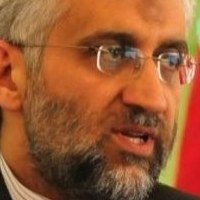![]()
Edited by Dr. Raz Zimmt
Originally published by the Meir Amit Intelligence and Terrorism Information Center, Spotlight on Iran issue, July 24, 2013.
This week Revolutionary Guards Spokesman Ramazan Sharif gave an extensive, rare interview to the reformist daily Shargh. In the interview, the high-ranking officer discussed the Revolutionary Guards’ interaction with the governments of Iran since the Islamic revolution, the organization’s involvement in politics and economy, the role it played in suppressing the 2009 riots, and its attitude towards president-elect Hassan Rowhani (sharghdaily.ir).
The Revolutionary Guards’ interaction with past governments
Sharif discussed the relationship that developed over the years between the Revolutionary Guards and the governments of Iran during the presidency of Ali-Akbar Hashemi Rafsanjani (1989-1997), Mohammad Khatami (1997-2005), and Mahmoud Ahmadinejad (2005-2013). Sharif spoke out against the often heard argument that, up until Ahmadinejad’s two presidential terms, and particularly during Khatami’s reformist administration, the relations between the Revolutionary Guards and the government were strained. While he did admit that the Revolutionary Guards disagreed with the domestic and foreign policy pursued by President Khatami, he argued that it was during President Ahmadinejad’s time that the Revolutionary Guards faced more difficulties, concerning their involvement in economic development projects.
He said that there was less interaction between the Revolutionary Guards and Khatami’s government, since the Revolutionary Guards support positions that reflect Iran’s strength and have a positive effect on its ability to deter its enemies. However, when it comes to their involvement in national development, the Revolutionary Guards faced greater difficulties during Ahmadinejad’s presidency, as was also attested by the former commander of Khatam-ol-Anbia’, the Revolutionary Guards’ construction headquarters. According to Sharif, it is impossible tosay for certain which government enjoyed the best relations with the Revolutionary Guards. The organization’s relations were easier and more reasonable, he said, with governments that obeyed the law. He noted that, in their capacity as protectors of the revolution, the Revolutionary Guards helped all the governments deal with the outside challenges facing the revolution and deter the enemies of the country. Iran’s security is the Revolutionary Guards’ gift to the government, Sharif said, and a president who is not preoccupied with security problems can do a better job of fulfilling his promises to the public.
The spokesman denied claims of Revolutionary Guards support for Ahmadinejad in the 2005 and 2009 presidential elections and stressed that the organization had never attempted to bring any particular president to power. He noted that the Revolutionary Guards’ involvement in presidential elections is evident in two specific areas approved by the Supreme Leader: ensuring a safe environment during the elections and providing for maximum citizen participation.
Sharif said that, while it is true that members of the Revolutionary Guards’ Basij force were positively influenced by Ahmadinejad’s positions and conduct, as seen during his term as mayor of Tehran, it does not mean that the Basij worked in any organized fashion to have him elected. The Basij members did prefer the approach represented by Ahmadinejad and tended to vote for him in the two election campaigns in which he ran for president. However, the Revolutionary Guards don’t tell the Basij members how they should vote, even though the Basij is subordinate to the Revolutionary Guards in the military chain of command. Sharif noted that the Revolutionary Guards are religiously barred from becoming involved in elections and in sectarian political struggles, and that it is a lie for anyone to contend that the Revolutionary Guards work for the benefit of one candidate or another.
Speaking about the deterioration in the relationship between the Revolutionary Guards and Ahmadinejad halfway through his second presidential term due to his disagreements with the Supreme Leader, Sharif said that the Revolutionary Guards are committed to support the government as long as it works within the confines of the law, and admitted that in the past two to three years differences of opinion have emerged between the organization and the president. He stressed that the Revolutionary Guards have an obligation to carry out the instructions of Iran’s decision-making bodies, including the Supreme National Security Council, as well as the instructions implemented with the Supreme Leader’s approval.
The Revolutionary Guards’ involvement in national economic projects
In the beginning of the interview, Sharif stressed that the Revolutionary Guards were established by the founder of the revolution, Ayatollah Khomeini, to protect the revolution and its achievements, and that Khomeini did not restrict the organization’s responsibility to specific threats or areas.
He noted that the Revolutionary Guards became involved in economic development projects in the aftermath of the Iran-Iraq War on orders from the Supreme Leader. This was owing to the organization’s engineering capabilities, the equipment it had available, and its manpower skills. Sharif said that the Revolutionary Guards, being in charge of protecting the revolution, could not remain indifferent to Iran’s ruined infrastructure and go back to their military bases once the war ended.
Sharif stressed that President Rafsanjani and his government gladly accepted the Revolutionary Guards’ involvement in the development of Iran, and that the organization was able to complete numerous large-scale projects during the Rafsanjani administration. The organization continued using its technical know-how and development experience during Khatami’s presidency, when many projects were turned over to the Revolutionary Guards. He noted that, during the Rafsanjani and Khatami governments, not even one claim was brought up against the organization’s involvement in economic development projects. The involvement continued under President Ahmadinejad, but during that time, according to Sharif, the Revolutionary Guards encountered greater difficulties than before since there were some in Ahmadinejad’s government who were opposed to the organization’s involvement in the development programs. He noted, however, that the sanctions imposed on Iran in recent years have made it necessary for the Revolutionary Guards to increase their involvement in various economic projects — in the field of gas, for instance — since those projects could not be carried out through local contractors.
Sharif said that, contrary to claims brought up by some of the media, the Revolutionary Guards make no attempts to get new projects and jobs for themselves, and that it is the government that takes advantage of the organization’s abilities on its own initiative. He argued that Mohammad-Ali Ja’fari, commander of the Revolutionary Guards, has worked since the beginning of his term to restrict the organization’s involvement in projects that can be completed through local contractors. Ja’fari resolved that the Revolutionary Guards would only be involved in projects that could not be carried out by local contractors but only by foreign companies. The Revolutionary Guards are not in charge of most of the national projects, Sharif said, which can be proven by statistical data. He noted that the Revolutionary Guards work in accordance with the law and that those who, during the recent presidential campaign, called for their exclusion from economic activity did so assuming that it would help them get more votes. The Revolutionary Guards have no wish to take on projects, but since they have sacrificed thousands of martyrs since the revolution, they are not willing to give away Iranian assets to the enemy. This is why, for example, they accepted the project to complete the development of the South Pars gas field.
The Revolutionary Guards’ involvement in suppressing the 2009 riots
Sharif justified the involvement of the Revolutionary Guards in suppressing the riots that broke out after the 2009 election, saying, however, that their involvement didn’t begin until well into the crisis. He noted that, when protesters first took to the streets in the first days after the election, the Revolutionary Guards avoided becoming directly involved in the events and simply attempted to prevent damage to life and property. Only when the regime opponents, who weren’t among the millions who had voted for the defeated candidates, took advantage of the opportunity to escalate the situation and the first incidents of damage to life and property started taking place were the Revolutionary Guards forced to intervene — temporarily and on a limited scale — to make the streets safe again.
According to Sharif, an investigation into the conduct of the Revolutionary Guards in the 2009 riots showed that no mistakes were made by the Revolutionary Guards during the events. The only flaw pointed out by Sharif in the way the organization handled the riots was not using the Revolutionary Guards commanders, who were popular with Iran’s citizens, for PR purposes. This had to do with concerns that the very fact of their media presence would create the impression that the Revolutionary Guards were intervening in the election.
The Revolutionary Guards’ involvement in the 2013 election
Sharif stressed that the Revolutionary Guards were not involved in the 2013 election in any way, and said that even the media of Iran’s enemies admitted that there was no such involvement. He said that there is no substance to reports that top commanders in the Revolutionary Guards, particularly Qods Force commander Qasem Soleimani, allegedly supported one candidate or another. He said that even though some candidates’ election headquarters wanted to use the names of popular, well-liked Revolutionary Guards commanders to gain political support, all reports about top commanders supporting a particular candidate were denied as soon as they appeared.
The Revolutionary Guards’ relations with the new government
Sharif noted that the Revolutionary Guards consider the recent election and the new president a good opportunity to achieve revolutionary ideals, and that they intend to help the new government as instructed by the Supreme Leader. Contrary to claims made by Iran’s enemies, the Revolutionary Guards have an obligation to help the government within the confines of the law and consider its success to be a success for the whole nation. He noted that, immediately after Rowhani’s victory, the Revolutionary Guards released an official statement announcing their intention to assist the new government. The organization plans to assist the government so that the regime can continue on the path of prestige and development and become a source of inspiration.
The Revolutionary Guards’ strengths and weaknesses
At the end of the interview Sharif discussed the strong and weak points of the Revolutionary Guards. The organization’s greatest strength, he said, comes from faith, adherence to divine values, its populist features, and its definition based on law and on the “rule of the jurisprudent”.
The organization’s main weakness has to do with public relations. Despite making considerable efforts, the Revolutionary Guards have been unable to boost public awareness of the organization and its performance. This can be seen in arguments made by Iran’s enemies that the organization controls approximately 95 percent of the projects, when in fact less than five percent of Iran’s development projects are held by the Revolutionary Guards. This is an indication of the organization’s weak public relations and media presence.
The Revolutionary Guards and the Rowhani challenge
The timing of the interview — given by Sharif just as president-elect Rowhani is about to assume office — is not coincidental, and neither is the spokesman’s decision to give it to the reformist daily Shargh. The interview reflects what may be some of the Revolutionary Guards’ concerns over the consequences of Rowhani’s election for president of Iran. One aspect that clearly stood out in the interview was the attempt made by the Revolutionary Guards spokesman to obscure the organization’s affiliation with the conservative right and with Mahmoud Ahmadinejad in particular — an affiliation that became all the stronger in the wake of the 2009 political crisis. Sharif took advantage of the interview to criticize Ahmadinejad’s conduct and lavish praise on the government of Rafsanjani, in whose footsteps Rowhani is seen as following. In addition, the spokesman used the interview to respond to criticism made in recent years by the political left and center in Iran, including former President Rafsanjani, over the Revolutionary Guards’ growing involvement in politics and the economy.
As far as the Revolutionary Guards are concerned, Rowhani’s election for president may lead to adopting a policy that could jeopardize the regime’s vital interests and their own as well. On the domestic scene, it is possible that Rowhani will take a conciliatory approach towards the reformist opposition, which supported him in the election campaign, and push for liberal political and cultural reforms that will include releasing political prisoners, increasing the freedom of the press, reducing censorship, promoting civil society institutions, and decreasing the involvement of the security apparatuses in citizens’ lives. During the election campaign, Rowhani criticized the “security atmosphere” that currently prevails in Iranian society, and, for instance, said he is opposed to security forces’ raids on the homes of those who use satellite dishes. Such reforms are considered by the conservative establishment and the Revolutionary Guards a potential threat to the stability of the regime and the values of the Islamic revolution.
The new president’s possible intention to reduce the involvement of the security apparatuses in society may lead to an attempt to diminish the involvement of the Revolutionary Guards on the political scene. Since the late 1990s — and particularly since the political crisis in 2009 — senior figures in the Revolutionary Guards have clearly and unambiguously sided with the conservative right and spoken out firmly against the leaders of the reformist camp. For instance, in a press interview given in July 2011, Mohammad-Ali Ja’fari, chief of the Revolutionary Guards, lashed out against former President Mohammad Khatami for supporting the opposition leaders in the 2009 riots, and argued that he would not be able to come back to politics. During the recent presidential campaign top Revolutionary Guards officials stressed that they were not intervening in the election. However, reports that appeared in the Iranian media indicated that high-ranking members of the organization supported candidates affiliated with the conservative right. For instance, media reported on the close relationship that Qods Force commander Qasem Soleimani had with presidential candidate and Tehran’s mayor Mohammad Baqer Qalibaf. During the presidential campaign, Soleimani was quoted by the Supreme Leader’s representative to Kerman Province as saying that he was going to vote for Qalibaf.
The economy is another arena where Rowhani may promote reforms that have the potential of hitting the economic interests of the Revolutionary Guards. Rowhani is known to have economic views that advocate reducing the government’s involvement in the economy. Neo-liberal reforms could hit some of the vital interests of the Revolutionary Guards, whose economic involvement has increased in recent years. The Revolutionary Guards’ deepening penetration into economic projects — which has gathered speed as a result of the economic sanctions, among other things — is increasingly criticized by the political establishment in recent years. Rafsanjani, head of the Expediency Discernment Council, argued in May 2010 that there was no justification for the Revolutionary Guards to remain intensively involved in the economy. Speaking at a meeting with governors, Rafsanjani said that while the organization’s involvement in the economy had been vital after the Iran-Iraq War to help revive the industry factories, that kind of involvement was no longer justified.
Rowhani’s views in the field of regional foreign policy could also pose a challenge for the Revolutionary Guards. The Supreme Leader may be the architect of Iran’s foreign policy, but it is not unlikely that Rowhani will push for a more pragmatic foreign policy, especially on the regional scene. Rowhani has announced his desire to improve the relations between Iran and its neighbors, mainly Saudi Arabia. In his efforts to improve Iran’s regional status, he will possibly strive to reduce the Iranian involvement in Syria. Recently Rowhani has time and again emphasized Iran’s support for the president of Syria and for Hezbollah, and Iran will most probably continue to consider the preservation of Bashar Asad’s regime as a top strategic interest. And yet, his stated pursuit of improved relations between Iran and its neighbors may also influence his stance on Iran’s involvement in Syria, where the Revolutionary Guards play a leading, major role.
The interview given by the Revolutionary Guards spokesman to Shargh might also be considered as a way of sending the incoming president a message to deter him from pursuing a policy that is not in line with the objectives of the regime. This message could be seen recently in a number of statements made by top Iranian officials affiliated with the conservative radical right. For instance, several days after Rowhani became president, Majles member Esma’il Kowsari, a former top commander in the Revolutionary Guards, warned about the return of Rafsanjani and Khatami to positions of political influence (http://www.asriran.com/fa/news/280550). In an interview to Fars News Agency, Kowsari said that, even though Rowhani needs to fulfill his promises to the public that voted for him, it is more important to protect the revolutionary, Islamic, and national values, and that Rowhani needs to appoint ministers who can put those values into practice (farsnews.com). In an interview given to the Tasnim News website several days later, Kowsari warned that, if Rowhani’s government engages in factional politics, the Majles will react accordingly (tasnimnews.com).



 RSS
RSS


















[…] [1] For more information, see “Spotlight on Iran — As Rowhani is about to assume the presidency of Iran, the spokesman for the Revolutionary Guards talks about that organization’s interaction with the government”, July 24, 2013. […]